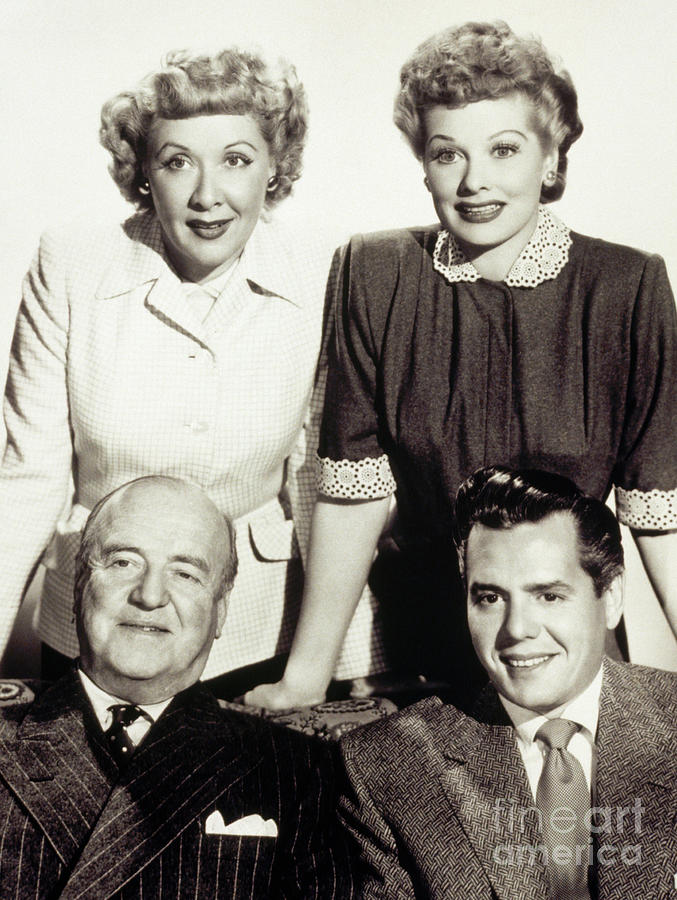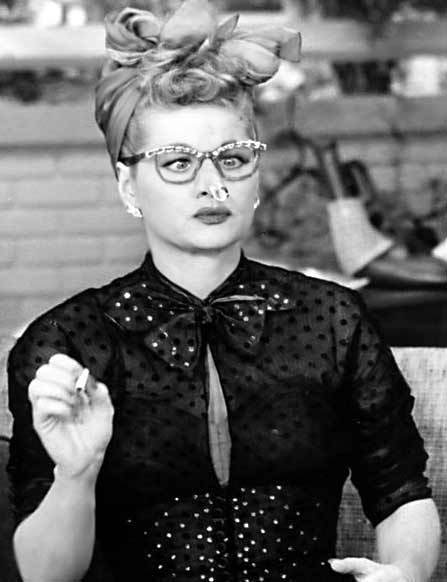Could a black-and-white sitcom, born in an era defined by post-war anxieties and technological marvels, still hold the power to captivate audiences across generations? I Love Lucy, which premiered in 1951, not only achieved immense popularity during its original run but has also retained an enduring appeal, proving its status as a cornerstone of American television history.
The show's premise, seemingly simple, revolved around the life of Lucy Ricardo, the vivacious wife of bandleader Ricky Ricardo, and their close friends, Fred and Ethel Mertz. The narrative followed Lucy's relentless, often misguided, attempts to break into show business, leading to a cascade of comedic mishaps. The show's enduring success stemmed from its relatable characters, the physical comedy expertly delivered by Lucille Ball, and the innovative use of the then-nascent medium of television. Each episode provided a snapshot of 1950s American life, interwoven with universal themes of love, friendship, and the pursuit of dreams. The series became a cultural phenomenon, influencing the sitcom genre and setting a standard for comedic storytelling that continues to resonate today.
| Actor/Actress | Character | Years Active on I Love Lucy | Noteworthy Achievements |
|---|---|---|---|
| Lucille Ball | Lucy Ricardo | 1951-1957 | Won five Emmy Awards, including Best Actress (1956). Pioneering female comedian and television producer. |
| Desi Arnaz | Ricky Ricardo | 1951-1957 | Co-creator and executive producer of I Love Lucy. Bandleader and actor, significant for his portrayal of a Cuban-American character during the era. |
| Vivian Vance | Ethel Mertz | 1951-1957 | Won an Emmy Award for Outstanding Supporting Actress. Known for her comedic timing and close relationship with Lucille Ball. |
| William Frawley | Fred Mertz | 1951-1957 | Experienced character actor with a long career in film before and after I Love Lucy. |
For more detailed information on the cast and crew, please visit IMDb
The creation of I Love Lucy was a collaborative effort, spearheaded by the vision of its creators, Jess Oppenheimer, and the direction of William Asher. These names represent the backbone of the show. The series' production team, often working with limited resources compared to modern television standards, managed to produce a show that not only entertained millions but also advanced the technical and creative boundaries of the medium. The innovative use of three cameras and live audiences during filming were critical elements that defined the show’s success, allowing for a more natural and dynamic performance from the actors and fostering a unique relationship between the performers and the viewers.
The show’s structure and narrative choices were revolutionary for the time. The half-hour format, the focus on character-driven comedy, and the realistic depiction of everyday situations were all groundbreaking. The decision to film the show using a live audience and three cameras was a significant departure from the standard practices of the time. This approach not only enhanced the show's comedic timing but also created a sense of immediacy and intimacy that connected with the audience on a deeper level. The live audience's laughter, a crucial element of the show's appeal, served as a feedback loop, guiding the rhythm and delivery of the jokes.
Lucille Ball's influence on comedy and television cannot be overstated. Her physical comedy, impeccable timing, and fearless approach to performing established a template for future generations of comedians. The show also provided a platform for Desi Arnaz to portray a Cuban bandleader, which was a step forward for representation in an era when diversity on television was not common. His real-life marriage to Ball added an extra layer of authenticity to the show, mirroring the domestic challenges and triumphs that many American families experienced.
The cultural impact of I Love Lucy extended beyond its comedic value. The show provided a window into the aspirations, anxieties, and everyday lives of Americans in the 1950s. Its depictions of family life, gender roles, and social dynamics offered a reflection of the era while also subtly challenging some of the prevailing norms. The show’s portrayal of the working class, its focus on the importance of friendship, and the themes of overcoming challenges resonated with viewers across the country.
The show’s popularity transcended geographical boundaries. It was syndicated to numerous countries, introducing American humor and culture to audiences worldwide. The global reach of I Love Lucy is a testament to the universality of its themes and the enduring appeal of its characters. The show’s ability to make people laugh regardless of their cultural background speaks to its timeless quality and its relevance to the human experience.
Beyond its immediate success, I Love Lucy was a pioneer in the business side of television. Desi Arnaz, through his production company Desilu, revolutionized the industry. He recognized the potential of reruns and syndication, a practice that would become standard in the television business. Arnaz’s foresight allowed the show to generate revenue long after its initial run, contributing to its lasting legacy and ensuring its continued availability to audiences. He also pushed for the incorporation of live-audience filming, which improved the show’s quality and created a bond with the viewers.
The show's legacy is preserved in various formats, from television reruns to home video releases and streaming services. Its influence can be seen in countless sitcoms that followed, with its emphasis on character development, physical comedy, and relatable storylines. I Love Lucy continues to be studied and analyzed by television scholars, and its impact on popular culture is undeniable. The series paved the way for other shows to explore different styles and formats, helping shape the landscape of entertainment for decades to come.
The awards and recognition that “I Love Lucy” earned during its run provide a valuable perspective on its importance. The series won five Emmy Awards, including Best Situation Comedy in 1953 and 1954. Lucille Ball herself earned the Emmy for Best Actress in 1956. This acknowledgement by peers in the industry serves as a validation of the series’ exceptional quality, comedic brilliance, and cultural significance. These accolades reflect the show’s widespread appeal and its lasting impact on television entertainment.
The longevity of I Love Lucy is a testament to its core values: the strength of friendship, the importance of family, and the power of laughter. The show's ability to entertain and resonate with audiences across generations proves its enduring appeal. It stands as a testament to the power of classic television, demonstrating that humor, heart, and a genuine connection with the audience can create a timeless masterpiece.
While the cast of I Love Lucy has seen many pass away since its original broadcast, the show remains a symbol of a golden age of television. The fact that the program continues to be enjoyed by new viewers is a clear indication that I Love Lucy still holds a significant position in television history. The show's ongoing success reflects not only its comedic brilliance but also its ability to capture the human experience in a manner that continues to resonate with audiences worldwide. The timeless quality of I Love Lucy is a reminder of the enduring power of laughter, friendship, and the simple joys of life.
The detailed production of “I Love Lucy”, from the initial concept to the final edit, is part of what makes the show so memorable. The innovative use of the three-camera setup, which was initially conceived to accommodate Desi Arnaz’s desire to film in front of a live audience, was an important part of the show’s success. This approach created a more vibrant and realistic viewing experience, which further enriched the viewers’ understanding of the characters.
The show's writers and crew members also significantly contributed to its success. The team, including such individuals as Jess Oppenheimer, Bob Carroll Jr., and Madelyn Pugh Davis, who penned many episodes, were experts at writing for comedy. Their sharp writing, with its clever plots, quick dialogue, and funny gags, helped solidify the program's enduring appeal. Their contributions made I Love Lucy the classic it is today.
The sitcom’s iconic status has created a variety of related products, from merchandise to theme park attractions. The show’s enduring popularity has made it a continuing presence in popular culture. Its recognition and influence are a testament to its quality, providing a constant reminder of its status as a classic and its wide appeal.
The episodes of I Love Lucy continue to be rebroadcast on TV. The series is also accessible on numerous streaming platforms. These broadcasts enable the show to reach fresh audiences while offering its long-time fans another opportunity to revisit their favorite episodes. This constant presence on various media platforms makes sure that the show remains relevant, introducing new viewers to the show's humor and charm while strengthening the show's ties to pop culture.
The cultural impact of I Love Lucy extended beyond mere entertainment; it also provided a reflection of 1950s American society. The series often provided a comedic commentary on the cultural trends of the time, including family dynamics, gender roles, and social conventions. Despite the changes in society since the 1950s, the themes of family, friendship, and the pursuit of dreams are as relevant today as they were then, which explains the timeless appeal of the show.
Ultimately, the success of I Love Lucy lies in its ability to tell stories that resonate with audiences of all ages. Through the relatable characters of Lucy and Ricky Ricardo, Fred and Ethel Mertz, and the comedic situations they get themselves into, the series offers a heartwarming depiction of the human experience. Its ability to evoke laughter, create a sense of familiarity, and offer a glimpse into the past are the reasons why “I Love Lucy” will remain a treasured television classic for generations to come.



